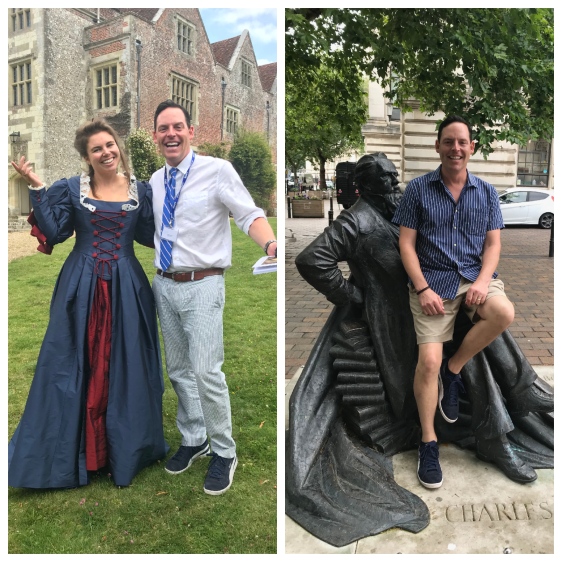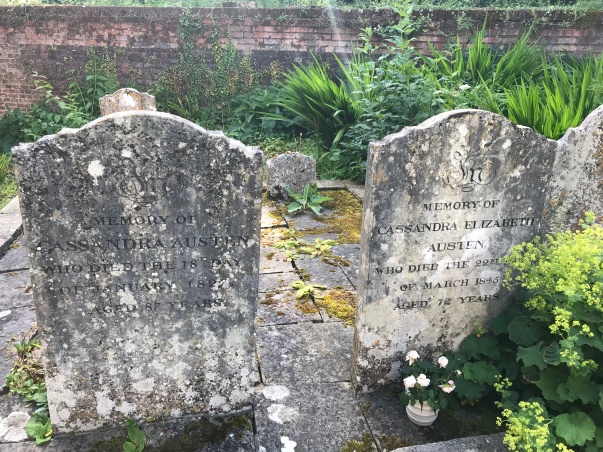Tags
austenland, boris johnson, brexit, britain, dickens, frankenstein, gardener, hampshire, Jane Austen, lewis carroll, mansfield park, mary shelley, portsmouth, UK
“You’ve had good weather. Jane is smiling on you.” – the Secretary for the Jane Austen Society of the UK
IS this a novelist or a cult?
If Austen is a writer, she is, according to one visitor at Chawton House today, the “greatest writer in history.” That’s quite a claim! Frankenstein is my favorite novel – it’s the Swiss Army knife of novels, really: you can do anything with it! – but I wouldn’t go so far as to say Mary Shelley was the greatest writer in the language. Have you read Valperga? Bloody hell! If Austen is a cult, it’s a pretty innocuous one: the followers prefer Earl Grey and cakes over Kool-Aid.

Yesterday was the annual general meeting, or AGM, for the Jane Austen Society of the UK, and my participation was the one requirement of the research grant that I received. The other was that I don’t use too much American academic jargon around the library: please leave your “Anthropocene” and your “queer performativity” in the coat check, thank you very much.
All in all, I didn’t have to do much as the first “bloke” to serve as the International Visiting Researcher here at Chawton House. Finally, my male privilege is paying off. They incorrectly announced that joining them from overseas was Dr. Colin Carman from Colorado University – it’s actually Colorado Mesa University – but I rolled with it. Apparently, Pakistan has just opened a branch of the Jane Austen Society. Elizabeth Bennet in a burqa. Gotta’ start somewhere!
I packed one J. Crew necktie and navy-and-white seersucker pants for the occasion, so I was doubling as a Southern mayor. I was even able to slip away during the lunch break in order to read The Guardian and eat my egg sandwich in the wilderness. “In these great places,” Mary Crawford declares in Mansfield Park, “the gardeners are the only people who can go where they like.” The same is true of college professors. The association’s president Sir Sherard Cowper-Coles presided. He was Britain’s ambassador to Afghanistan. If you can survive that colonial sand trap, surely you can figure out the alternative ending to Persuasion. Below is a picture of me and the “brill” Clio, a graduate student at Southampton University, which we took after I traveled by a vintage coach from Alton. Dating from the 1960s, the coach could have easily doubled as a greenhouse once the sun came out and it was good we had the wind at our back to reach our destination.
(The other picture is of me playing the lap-dancing stan to Charles Dickens in Portsmouth. Chuck looks grumpy, eh? He preferred the company of underage girls; oh wait, that was Lewis Carroll.)

The idea that Austen was somehow divorced from reality, and the political events of her time – oh you know, just those minor skirmishes known as the Revolutionary and Napoleonic wars and the American war of 1812 – is a myth that stubbornly persists. The fact is that she explored how major historical events affected English people in private. Their reactions to public events always reveal their innermost character. Those who think that Austen toiled away in rural isolation don’t know that her cousin Eliza married a Frenchmen, the Comte de Feuillide, who was later guillotined (outlined in 1794). I hate when that happens. The coquettish life of his widow, Eliza, has been thoroughly researched by Deirdre La Faye (who was missed at this year’s AGM). La Faye made a major and meticulous deposit in Austen studies.
Speaking of the French, the lecture at the AGM was on Austen’s connections to French culture – the “French connection” – and it was an important reminder that Brexit and the premiership of Boris Johnson (or “BoJo” as the tabloids call him) are existential threats to England and globalism more broadly. Austen never crossed the Channel but she did enjoy her many trips (to see her brother) to London, which she described in her letters as the “Regions of Wit, Elegance, fashion, Elephants & Kangaroons” (sic). Did you know that the so-called greatest novelist in the English language had horrendous spelling? There was no auto-correct, of course, and read Love and Friendship to see how she consistently confuses her Is and Es, so “Freindship” over and over again. I before E except after C, June Austin! Here the townie Mary Shelley, whose famous philosopher father, tutored her in their London home, had the country girl beat. Her Monster: “Friend, goooood!”

At the AGM, the average age of the attendee was 75 and bless their hearts: these devotees train 51 miles SW from London to Alton, bus to Chawton (roughly a mile away), and listen to a guest lecturer carefully selected for his/her lack of jargon. The British approach to literary studies is very different than America’s – they find our research a bit “wacky” and daft – and an Oxbridge professor can get away with an entire essay on the use of dipthongs and assonance in Pride and Prejudice whereas we Americans only take notice when you use “post-structuralist,” “Foucault,” and “Marxian hermeneutics” in a single sentence.
It was in the country village of Chawton that Austen transformed herself into a professional writer. She heavily revised the drafts she had on hand of Pride and Prejudice and Sense and Sensibility (composed in her birthplace of Steventon), and, over the last eight years of her life, she completed a trio of new works: Mansfield Park, Emma, and Persuasion. By then time, Austen was middle-aged (by Regency-era standards) and therefore past the usual age at which an English woman married. “Being now in her twenty-first year, Maria Bertram was beginning to think matrimony a duty” (Mansfield Park 67).

Shrewdly, she realized that writing for money could be her ticket to ride. In 1814, she wrote her beloved niece, Fanny Knight, to report that there may or may not be a second edition of Mansfield Park, adding: “People are more ready to borrow & praise, than to buy – which I cannot wonder at; – but tho’ I like praise as well as anybody, I like what Edward calls Pewter too.” Without her novels, Austen would have died penniless.
While we are on the topic of my family, my paternal grandparents were Revolutionary War reenactors. My grandfather would get all dressed up in his three-cornered hat, hunting shirt and matching breeches; my grandmother donned the bonnet and looked like a regular Abigail Adams. I suppose it’s these folks that passed down the DNA for loving history. Austen is synonymous with the Regency period and its frilly fashion. Skip “The Jane Austen Book Club” and watch instead the benignly funny Austenland for a light-hearted romance in which an American girl (Keri Russell) travels to England to immerse herself in her hero’s native countryside and find her very own Mr. Darcy. Along the way, we’re told, she’s excited to meet such Regency-era women as Mrs. Pepper Pot and Mrs. Wigglewam.
Wham, bam, thank you, Ma’am!
PS: How precious is this quirky English fellow who insists on wearing Regency-period clothing to work?





 For now, here are four important facts about Jane Austen, her life and works.
For now, here are four important facts about Jane Austen, her life and works.








 Huntsman,”
Huntsman,”
